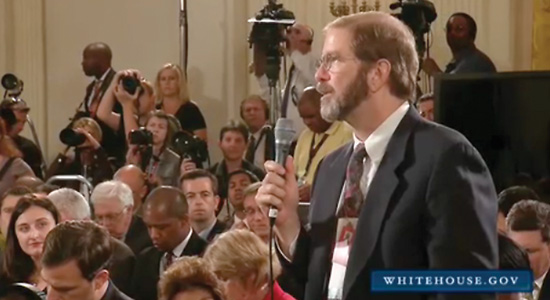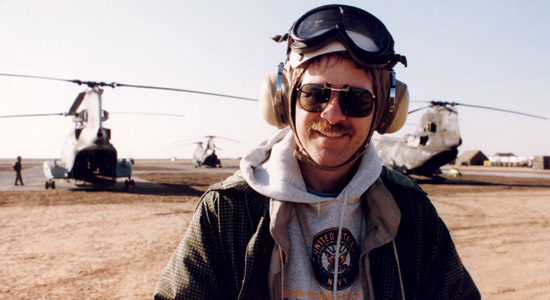Alum David Alexander: Front Row at the White House
January 7, 2010
David Alexander, who graduated from Oklahoma Baptist University in 1979, was buying food with his last pennies when, as a young, dead-broke journalist, he took a job at the Lebanon Daily News in Pennsylvania. A couple decades and thousands of globe-trotting miles later, Alexander now has a front-row seat for national and international politics as a Reuters reporter assigned to the United States' top leaders.
Alexander's journey from Bison Hill, through central Pennsylvania, to Pennsylvania Avenue began as the child of Southern Baptist missionaries to Chile and Peru. His parents, Charles and Betty Alexander, served with the International Mission Board from 1966-94. They were members of OBU's Class of 1954. Following his parents' footsteps to Oklahoma, David Alexander said he felt encouraged to pursue his varied interests through a liberal arts education at OBU.
"I majored in philosophy and took lots of classes in history, economics, political science, art and math," he said. "And I took advantage of opportunities that presented themselves. I worked as a photographer for the school, reported for the school newspaper and ran for student government offices.
"In the end I spent five years at OBU and amassed way more credit hours than I needed to graduate. It was a nurturing environment and I enjoyed the experience."
Alum David Alexander poses the second question to President Obama during a televised press conference on July 22, 2009. The full press conference may be viewed at www.whitehouse.gov.
After working at the Shawnee News-Star for several years, Alexander decided to attend graduate school. The Pennsylvania State University responded to his application first and offered him a teaching assistantship, so he moved to the Keystone State for the one-year program. He taught two sections of introduction to journalism and completed his course work, but he never finished his thesis. Later, while working in London in the mid-1990s, he would earn a master's degree from London Business School.
After Penn State, Alexander found himself penniless. He accepted a job as assistant city editor at the Lebanon Daily News in Lebanon, Pa. He stayed in a run-down motel until he earned his first paycheck, which afforded him the luxury of renting a place to stay. He stayed in the job for about a year.
He applied for a job with United Press International in Harrisburg, Pa. After a few months uncertain of the outcome of his interview, he received an invitation from the UPI state editor in Philadelphia. He learned UPI had run into financial woes and had a temporary hiring freeze. With the company's finances recovering, he was offered a job, which he accepted. It opened the door to an exciting, globe-trotting career in journalism.
Following two years in Philadelphia, Alexander worked on the UPI foreign desk in Washington, D.C. He edited copy from correspondents and stringers overseas. He was on the foreign desk for about a year before being posted to the Jerusalem bureau.
Alexander worked in the Jerusalem bureau for about six months before financial woes once again plagued UPI. He was laid off, so he worked as a freelance journalist in Jerusalem for about six months before UPI offered him a job back on the foreign desk in Washington. He worked there until he was posted to New Delhi.
From New Delhi, Alexander worked two years as bureau chief for South Asia. His responsibilities included coverage of Pakistan, Afghanistan, India, Nepal and Sri Lanka. In 1990, he went to Saudi Arabia to cover the military buildup following Iraq's invasion of Kuwait. India's government fell shortly after the end of the first Gulf War, so he returned to New Delhi to provide media coverage of the elections. 
International journalist David Alexander prepares to board a helicopter during his coverage of the first Gulf War.
"I was in Delhi when Rajiv Gandhi was assassinated while campaigning in southern India," Alexander said. "While in India I went to Kashmir several times to report on the insurgency there. I also did some reporting in Nepal, Pakistan and Afghanistan. In Afghanistan I interviewed Najibullah about a week before his government fell and he went into hiding in the U.N. offices in Kabul."
Alexander returned to Washington in 1992 and worked on the UPI foreign desk again for about a year before being posted to London. In the United Kingdom, he worked first as the deputy bureau chief and later as the editor for Europe, the Middle East and Africa. UPI folded its operations in Europe and Africa in 1997. Alexander returned to Washington in 1998 and was hired by Reuters.
The past few years, he has worked mostly as a general assignment reporter and deputy news editor. He worked part time at the White House during the last nine months of the Bush administration, and he worked full time at the White House during the first six months of the Obama administration. Once again doing general assignment reporting and news editing, some days he writes stories and other days he assigns and edits stories.
"Since I'm a general assignment reporter, I bounce around a lot," he said. "I went down to Guantanamo Bay a couple of years ago to report on the pretrial hearing of Osama bin Laden's driver. I was with Secretary of State Condoleezza Rice on her diplomatic travels after war broke out in Georgia last year. In the course of little more than a week we were in southern France, Paris, Tbilisi, Crawford, Washington, Brussels, Warsaw, Turkey, Baghdad and Washington. And I was with Obama on a number of trips, including his visit to Cairo for the speech to the Islamic world."
While Alexander has no immediate plans to change his current job, it's a job that is constantly changing - by geographical location and news story subject. He covered the Palestinian intifada, the first Gulf War and the conflict in Kashmir. He reported on such things as the Jamie Bulger murder case in England, the marital breakup of Charles and Diana and the Downing Street Declaration that started the Northern Ireland peace process. Last summer, he could be seen asking President Obama a question during a press conference televised across the country and around the globe. In just the past month, he reported on Hillary Clinton and traveled around the world - to Berlin, Singapore and Manila - and back.
For Alexander, a front-row seat at a White House press conference or a jaunt to another country with a Cabinet member is just another day at the office.
For more firsthand accounts of Alexander's global journalistic experience, go online to www.okbu.edu/obumagazine.